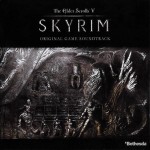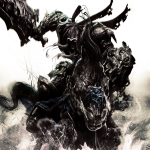We’ve featured this “tower defense action adventure RPG” a few times on the site, but I thought I’d go back and provide an official review after the original Soulcaster won our OSVOSTOTY 2011 first-runner up award in the Best Indie Game Soundtrack category.
What we have here are the soundtracks to both the original Soulcaster and Soulcaster II, both composed by game designer, artist, and programmer Ian Stocker. Not only is it incredible that he was able to do this all on his own, but the fact that all the elements come together so well is astonishing.
Hit the jump for our impressions of the dual soundtrack release.
You may recall that we actually hosted a few tracks from the game for free on OSV some time ago. Those were just two of the nine tracks that are featured from the first game, but even these have been remastered for this official digital release.
The album opens with the sweeping main theme, immediately taking you back in time with its distinctly retro 16-bit sound. The theme is immediately memorable, and fits perfectly with the fantasy setting of the game. “Ruins” opens with these mysterious arpeggios as you’re first exposed to the dangers of the world of Soulcaster, while “Dungeon” a few tracks later gets more funky and confident as you master your summoning skills and plunge deeper into enemy territory. “Awakening” gets down and dirty with a meaty bassline that will have you tapping your toes and “Quest” sports some beautiful synth choir arpeggios with an enchanting melody that eventually melt away into a crazy bass and percussion funk fest.
Stocker injects a heavy rock sound into “The Merchant,” who happens to be the Grim Reaper, which is a fan favorite track, while the short-but-sweet “Glade” and “Remembrance” tread on more soothing territory.
Soulcaster II’s main theme is considerably more epic, opening with synthesized electric guitars before getting into the fantasy adventure thing. The dungeon themes here are much heavier, starting with “Fearless” which does feature playful bits on the flute, but also sports a snare drum that will slap you in the face. “All Souls Alliance” sports a gritty synth bass and flanged electric guitar synth melodies that literally tear it up. Next, “Death Emerges” is an tense track with foreboding arpeggios followed by string stabs that are simply nerve wracking, while the final stage theme, “Untouched by Sunlight,” in melancholy and reflective, featuring some beautiful piano work that contrasts quite nicely with the sheer difficulty of this stage.
“The Merchant Returns” brings back the electric guitar for another rock out session, while Stocker teams up with Chris McCarron for a sweet reprieve titled “Storybook.” The lullaby-esque sound carried by acoustic guitar and layers of bells and chimes is fitting of the title.
There are also two bonus tracks, one for each soundtrack. The original Soulcaster offers “Trailer,” which is, as the title would suggest, the track that accompanied the first game’s trailer. It features mainly electric guitar with thumping percussion, driving home the intensity of the gameplay while working in some fantasy melodies as well. Soulcaster II gets “Soulcaster – Surasshu 8-Bit Remix.” Yeah, Surasshu as in former OSV editor Surasshu! He provides a convincing 8-bit remix of the memorable theme, which is a nice addition.
While the soundtracks combined only total about 35 minutes of music, what’s here is excellent. It’s made even better if you’ve happened to check out the game, which I highly recommend doing. In fact, the games are individually cheaper than the combined soundtrack, which will set you back $5. While this price tag may be a little high when you consider other indie game soundtracks going for $0.99, all proceeds are going to fund Magical Time Bean’s upcoming projects, making it a good cause as well.
What do you think of the Soulcaster games and their music? Are you surprised that one person is behind all the creative elements of the game?
Tags: Digital, Ian Stocker, Magical Time Bean, Music Reviews, Reviews, Soulcaster, SoulCaster II, Videogame









































Everything about these games are just awesome. I also think that having one person make the game and the music helps the music fit with the game a lot better. The game creator knows the ins and outs of that game so much more than some music programmer who just gets an outline of the game. Or even one making music based on a play through or two of the game.